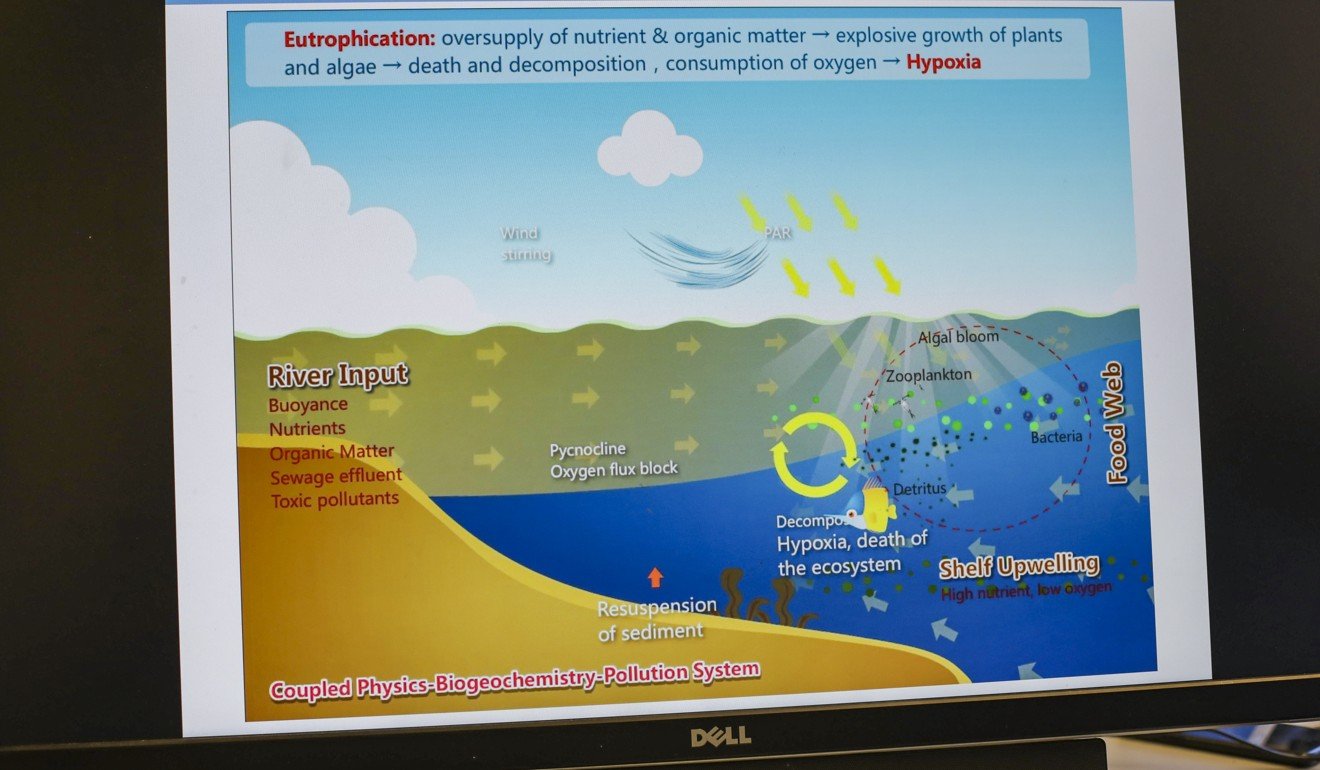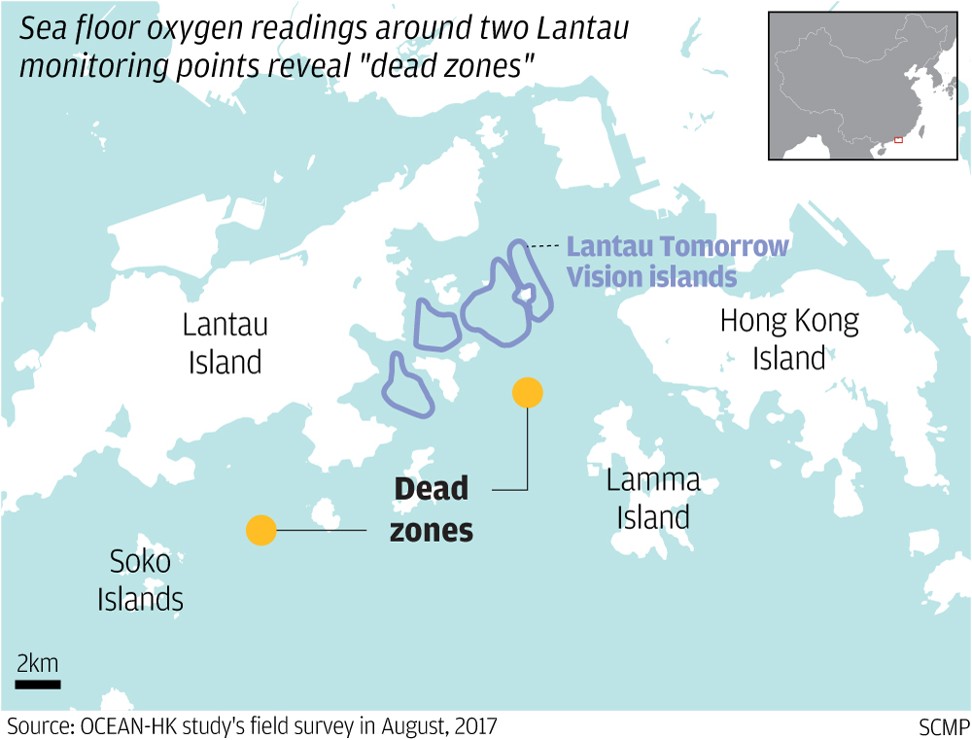
Smelly harbours and lifeless waters? Lantau Tomorrow Vision reclamation could add to nearby ‘dead zone’, scientists warn
- Researchers urge impact assessment with discovery of low-oxygen areas near site of proposed artificial islands
- Supporters play down concerns, saying proper study will be done and ecological impact not as significant
A team of researchers conducting a study around the South China Sea told the Post that latest findings indicated two seasonal zones with low oxygen levels to the south and southeast of Lantau Island.
The southeast dead zone was near the proposed 1,700-hectare reclamation site, under the government’s “Lantau Tomorrow Vision” plan to house 1.1 million people in an economic and residential hub.
One scientist in the Ocean-HK study team – comprising researchers from various institutions – warned the reclamation could further weaken the sea’s ability to flush out waste water, causing oxygen depletion, while others urged the government to conduct a comprehensive impact assessment.
But authorities disagreed the area was a dead zone, citing their own positive observation.
Expect worsening water quality, smelly conditions, a higher proportion of red tides …
“I wonder how they will sell properties [on the artificial islands] in the future”, said David Baker, one of the researchers and an assistant professor at the University of Hong Kong’s Swire Institute of Marine Science.
“The public can expect worsening water quality, smelly conditions, a higher proportion of red tides [caused by algae] and dead fish … that makes going to the waterfront less attractive.”
A dead zone is where oxygen near the sea floor drops to a level that can choke marine life or cause animals to avoid the area. With water quality compromised and other effects such as odours, fisheries will also be affected.
This phenomenon happens in the summer, when weak winds are unable to transport ocean surface oxygen to the sea bottom.

According to Gan Jianping, study coordinator and chair professor at the University of Science and Technology’s department of ocean science and mathematics, a field survey in August last year identified the Lantau dead zones, where oxygen around the sea floor had dipped to 2 milligrams per litre – a threshold for marine life to survive – or lower. The survey is also part of the Ocean-HK study.
Gan said such oxygen depletion, called hypoxia, was caused by an excess of nutrients from discharges from the Pearl River Delta and around Hong Kong.
Is Hong Kong ready to splash HK$500 billion (or more) on Lantau reclamation?
Islands like Lantau, located at the river estuary, slow down currents, concentrating nutrients and contributing to algae growth. When a blossom of algae die, they sink to the sea floor and decompose, sucking up oxygen.
Baker feared the artificial islands could decelerate currents around Stonecutters Island to the north, where a treatment plant discharges waste water from the city’s central urban areas.

“To the north you have the discharge point, and then to the south you have … the worsening dead zone, so neither of these are particularly attractive to someone looking for a home,” he said.
Building canals on the proposed islands, as some official renderings showed, would create a much larger volume of stagnant water that would become foul-smelling, he added.
Island residents warn against reclamation, fearing ‘sins for a thousand years’
Gan said the problem was not limited to the Lantau region. He said Environmental Protection Department data showed that between 1990 and 2012, bottom oxygen levels during summers had dropped to 2.5mg/l in northwest and northeast waters, and to almost 3mg/l in Victoria Harbour.
“People do not realise how serious this problem is,” Gan said. “Hong Kong waters are facing severe ecological and environmental damage.”
Baker said one mitigation method would involve a costly scheme to remove nutrients from sewage across the city before these were discharged.
A proposed upgrade of a harbour treatment scheme would achieve that, but the plan would not cover large parts of the New Territories or outlying islands like Lantau.
Gan said the proposed islands could be designed so that major marine passages would not be blocked and currents could be sped up.
He urged the government to conduct a comprehensive study, which should look at ocean hydrodynamics, nutrient sources, the waste water cycle in the environment and the affected ecosystem.
Professor Ho Kin-chung, a water quality expert who is not involved in the study, said the design of artificial coastlines should be smooth to prevent water trapped in bays or curved shores.
Hong Kong ‘throwing money into sea’ with proposed reclamation: concern groups
An Environmental Protection Department spokesman said it recorded an annual average bottom oxygen level of above 5mg/l to the southeast of Lantau, and found no adverse ecological changes. “We cannot agree that the waters of east Lantau are a dead zone,” he said.
But scientists argued that annual averages did not reflect the real situation as hypoxia only happened in the summer.
The spokesman said water quality indicators around Hong Kong had consistently recorded positive results, and red tides had occurred less often in southern waters, so nutrient oversupply was “not a key issue” to east Lantau.
He added that the harbour treatment scheme upgrade was “not critical” for meeting water quality standards, and the government would keep it under review.
The spokesman acknowledged an environmental impact assessment was required for any reclamation, and oxygen level would be one of the aspects addressed.
A Development Bureau spokeswoman said the proposed reclamation area was less sensitive ecologically. She said the government would explore advanced and environmentally friendly techniques and designs for the project.
Think tank Our Hong Kong Foundation, an ardent supporter of the government’s Lantau reclamation plan, said its own study found the ocean environment feasible for the project. But the foundation’s report did not discuss hypoxia. Stephen Wong Yuen-shan, its deputy executive director, declined to release more details of the study.


